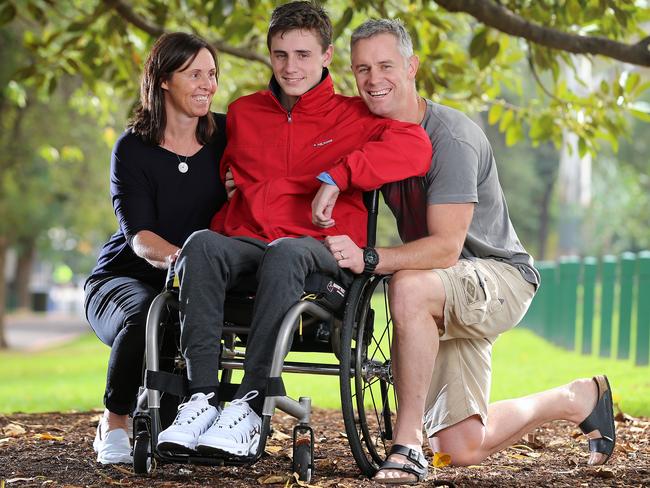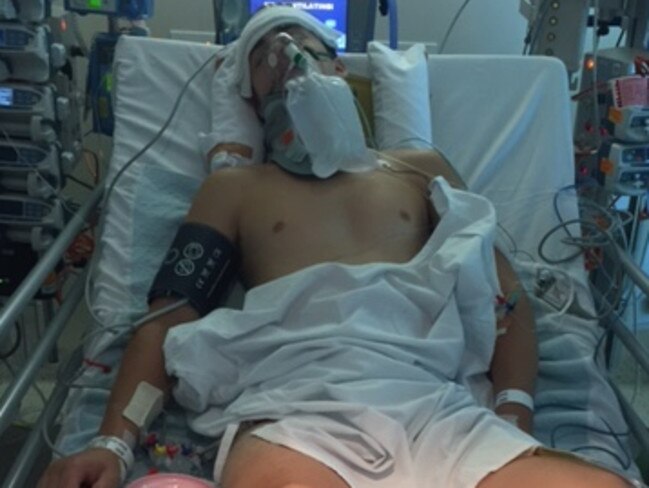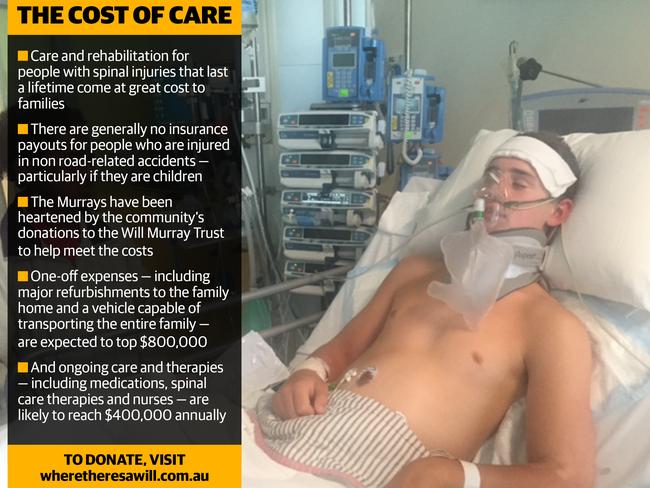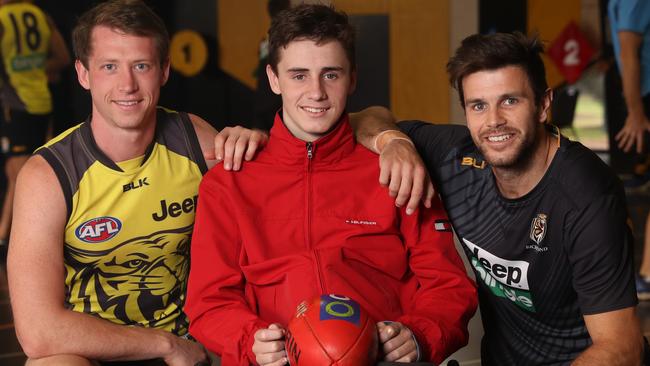Will Murray ready for new life 12 weeks after life-changing injury
JUST 12 weeks ago, this footy-loving teen was in intensive care. today mum Emma says he heads home ready to start a new life
News
Don't miss out on the headlines from News . Followed categories will be added to My News.
WILL Murray scooped up the loose footy from near his under-13 team’s back line. His dashes, high marks and hefty shepherding said more than the boy ever did when he wasn’t playing sport.
Will’s reply to the opposition’s mistake that day was brutal. His size 13 feet sped him down the wing to the forward end. One bounce, two, four. Nobody could catch him.
He was taller than most of them. Five bounces. Then six. A defender moved in to stop his charge. Will handballed the footy to himself, over the defender’s head like they do in the AFL seniors. He expected he’d be drafted one day.
He kept powering towards the posts. And then he booted it through for a goal. That was one to remember.
“It would’ve been a bit embarrassing if I’d only kicked a behind.” He grins.
That full-field dart was seven months ago. He is now sitting in a wheelchair.
Will — who had not broken a bone nor endured a surgeon’s stitch in 14 years of life — had jumped from the Half Moon Bay pier on January 17 and fractured the C5 vertebra in his neck.
Emma, his mum, explains that until that moment, Will’s answer to everything was to move. “From the time he could walk, he was walking away from us,” she recalls.


And today, after 12 weeks in hospital, Will goes home with his family. The hospital departure is early compared to that of most other spinal patients. But Will and his family are keen to start the hard, relentless and costly work of rehabilitation.
So, now that Will has lost so much of his movement — the thing that Emma believed most defined him — how much of Will is left?
Emma pauses, then says: “In a funny kind of way, there’s more of Will now. Now that he’s still.”
For the week after the accident, as her son lay motionless, sedated in the Royal Children’s Hospital ICU, Emma felt Will’s life was over. Surely, he’d rather die than live as a quadriplegic.
So Emma had pushed for a “Do not resuscitate” order in her son’s medical file.
It was a confronting time for a woman who made a living teaching mindfulness, most recently to Richmond footy players. She talked about living in the moment — finding contentment in each breath, the taste of the food in front of you. All the stuff that able-bodied Will didn’t appear to get.
She recalls her distress at the hospital on the day the medical staff lifted his sedation, petrified at how Will would react to the news he’d never be the same.
She could remember clearly Will’s question to the surgeon the night he went into surgery, the day of the accident: “Will you fix my legs for me?”
Now that he was to wake up, he would learn the answer was “No”.

But Will never had that moment of painful realisation. There was just belief, hope and acceptance. These were things Emma had tried to teach her rowdy get-me-outta-here boy.
He had been listening to her after all.
Until the moment of the accident, Will was always looking for something better. Something more fun.
His dad, Nick, dropped him off at the bay to hang out with mates. It was a bit after lunchtime on the January day when everything changed. He drove home but had barely sat down when Will called to be dropped at a friend’s place instead.
It was hot. Nick finished what he was doing and headed back to his son. He double- parked and called Will’s mobile.
No answer. He called again. Texted. Waited. No Will. He grumbled and headed for home again. But a few minutes up the road a call came through saying Will had had an accident.
He imagined a gashed foot on a rock. Or a piece of broken glass in his toe. But when he arrived at the beach paramedics were tending to him on a spinal board.
And Will told him he couldn’t feel his legs.
“When you hear that, you want to believe that it’s temporary. The paramedics were doing their best to be encouraging,” Nick says.
“But inside I knew how bad it might be.” And it was.
The Royal Children’s Hospital was Sunday night-quiet when Will was prepared for surgery.

Emma, Mick and Will’s grandparents, Wendy and Peter Gleeson, made a pact. No matter what lay ahead they would not be torn apart. They’ve formed the kernel for an enterprise to help Will progress as far as technology will allow. To keep him in good shape so that his body might benefit from treatments yet developed.
His quadriplegia is serious but incomplete. (Spinal cord injuries are like snowflakes — no two are the same.) He still has control of his biceps and wrists, so he can wheel his chair weakly. And he controlled his big toe to twitch a few weeks ago.
Emma has hooked into a circle of researchers who say hard work and access to medical technology early after spinal injuries can improve the chance of function below the injury site.
Yet she is surprised how quickly she let go of dreams she had for her son. He was a good chance for an AFL career. Now, she dreams of him having a pincer grip.
She blogs Will’s progress peppered with her thoughts on mindfulness on the website wheretheresawill.com.au.
The Will Murray Updates Facebook page has almost 15,000 followers. She’s caught the attention of community leaders. She’s been asked to speak at a Brighton Rotary Club function next month, alongside 2015 Australian of the Year and domestic violence campaigner Rosie Batty, and paralympic medallist, amputee Don Elgin.
“I don’t really feel like I belong there,” she says. But others judge differently.
And the competitive ferocity of Will’s sporting days are still there. They show through when he’s with his friends who have rallied. And in small things, like a game of Words With Friends on his iPad against his grandmother.
“He’s still obsessive, he’s competitive, he’s bantering ... and sometimes he’s cheating,” Emma says. “Every moment matters. And Will is still as Will as Will can be.”
To donate, please visit wheretheresawill.com.au


